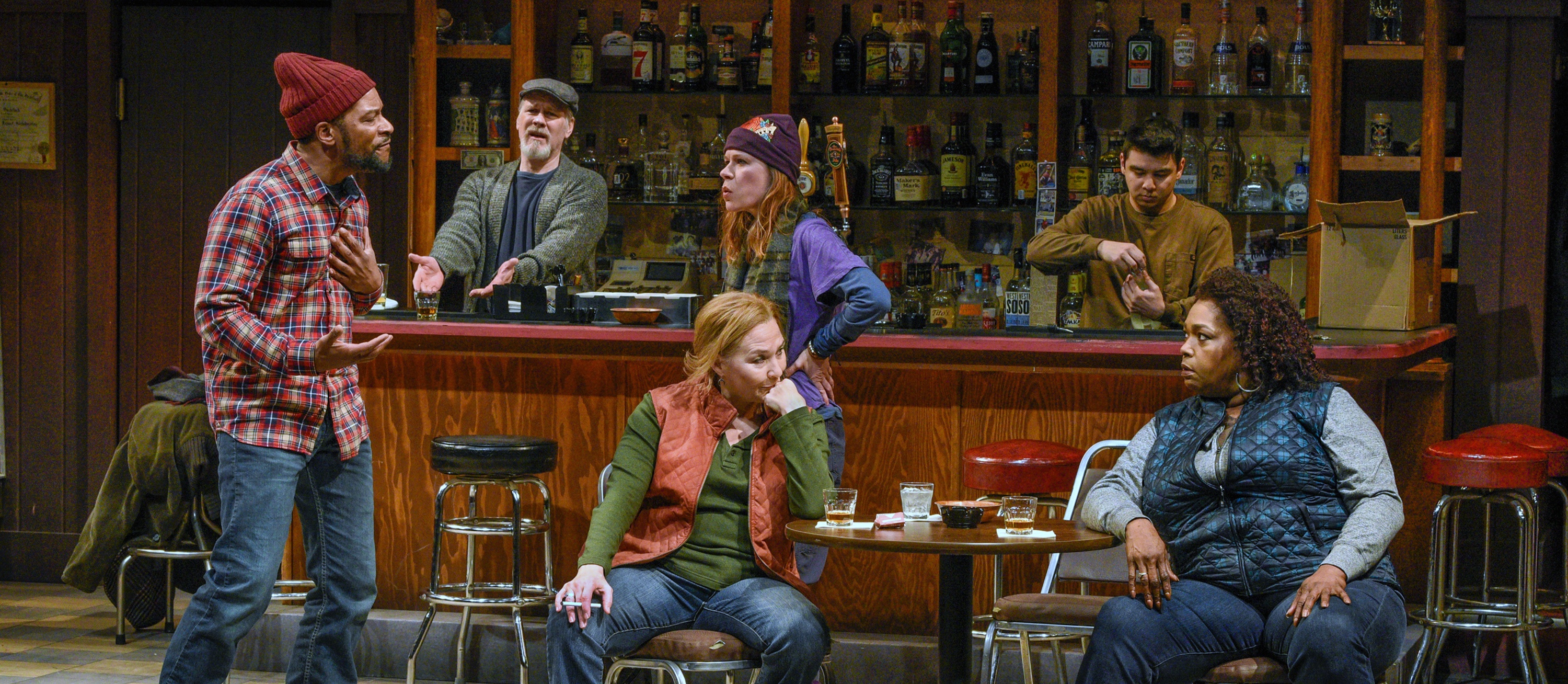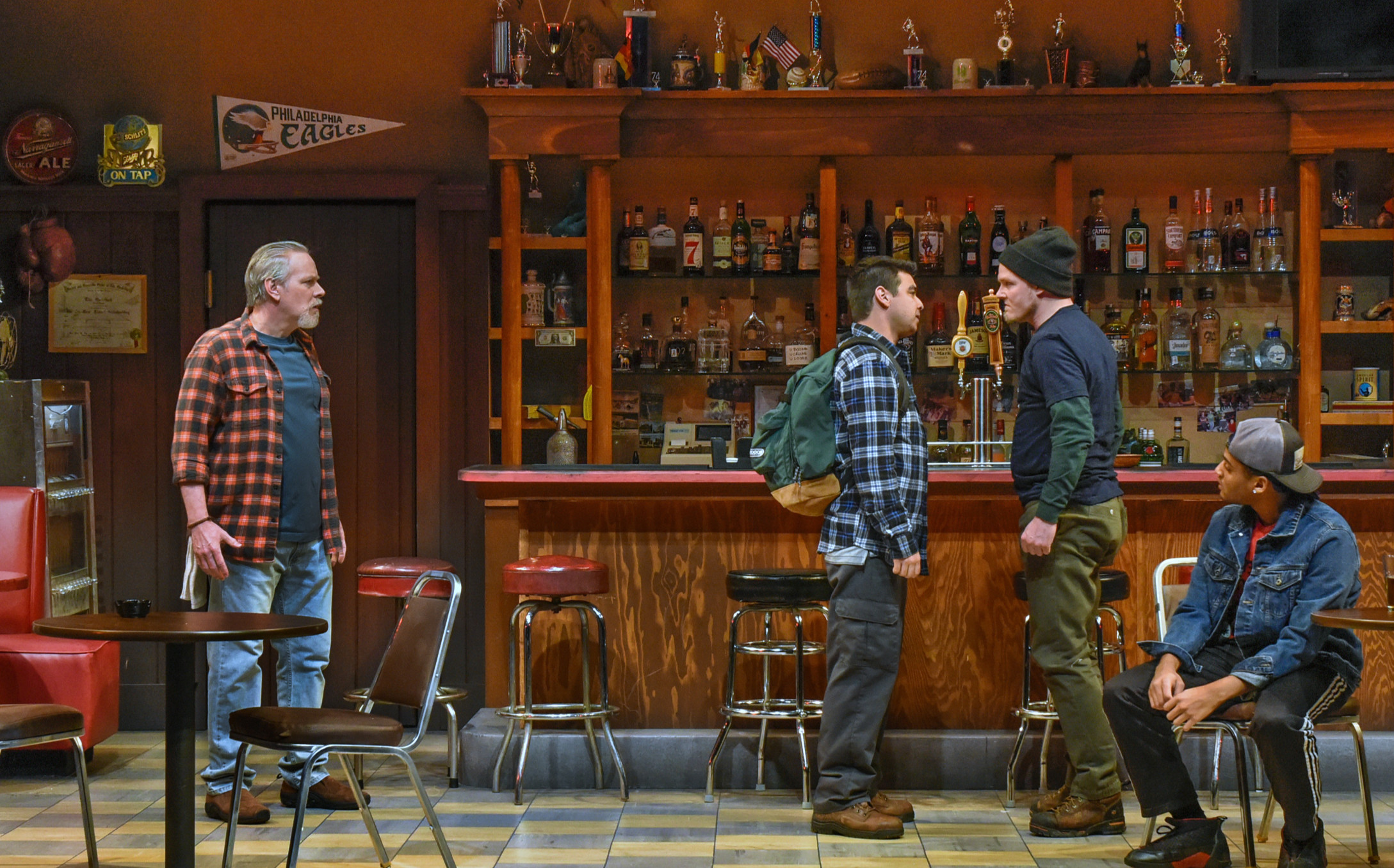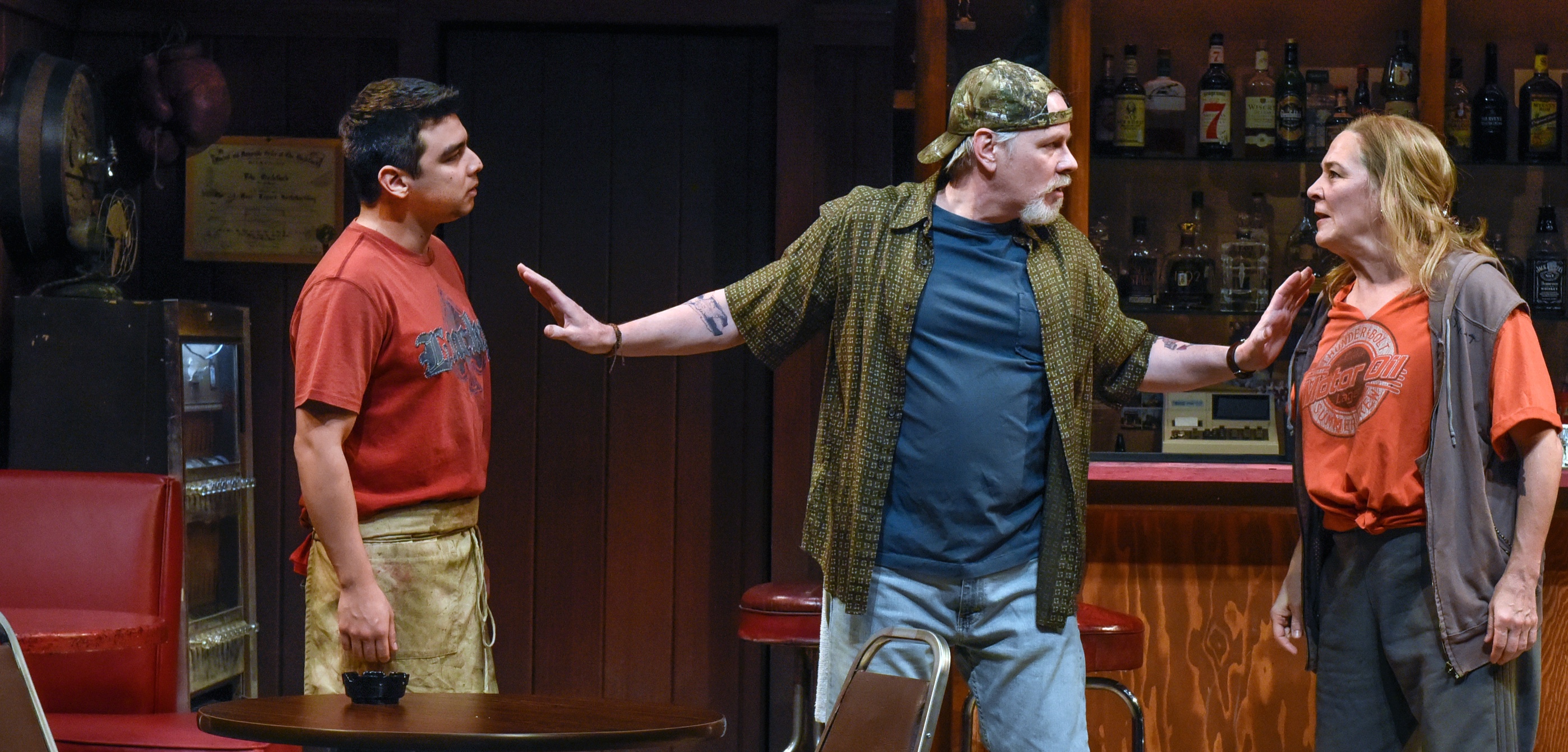Review: Working Up A Real ‘Sweat’ At The DTC
ArtandSeek.net February 7, 2019 34America has changed fundamentally the past 20 years. And it’s not just in technology. Those economic upheavals you’ve felt are at the heart of Lynn Nottage’s drama ‘Sweat.’ In this week’s Art & Seek Spotlight, Jerome Weeks reviews the Dallas Theater Center’s production of a play he calls an epic heartbreaker.
My mother grew up not that far from Reading, Pennsylvania. It’s a mid-sized, Rust Belt, union town once powered by coal, steel and railroads. Odds are, you’ve been there, too. Figuratively, at least, if you’ve ever landed on that little square on the Monopoly game board, the one called ‘Reading Railroad.’ Because of my mom, I knew even as a kid it was pronounced ‘Redding Railroad,’ not ‘Reeding Railroad.’

Kenajuan Bentley Jon Shaver, Sally Nystuen Vahle, Barbra Wengerg, Christopher Llewyn Ramirez and Liz Mikel (l to r) in ‘Sweat’ at the Dallas Theater Center. All photos: Karen Almond.,
Imagine what an industrial powerhouse Reading must have been to earn a square in Monopoly – along with Park Place and the Electric Company. Now, it’s got the largest share of people living in poverty of any American city – and most of us don’t even know how to pronounce its name. That long, brutal fall – and what it’s meant for American workers and cities – is what ‘Sweat’ is all about. Lynn Nottage’s Pulitzer Prize-winning drama is currently being given its area premiere in a thoroughly muscular work-out by the Dallas Theater Center.
‘Sweat’ is notable for more or less revolving around several female friends, all factory-floor workers – and no big deal is made of this. In this exchange, Theater Center veterans Liz Mikel as Cynthia and Sally Nystuen Vahle as Tracey are living it up as just part of the crew.
Cynthia: “OK, I’m officially drunk-bedonk. Which means I gotta go!”
Tracey: “No!”
Cynthia: “Got an early shift!”
Tracey: “One more drink. C’mon, c’mon. One more! It’s my birthday.”
Cynthia: “OK! OK!”
Tracey: “Stan, pour this chick another drink!”
The women’s presence is notable because “Sweat’ is a big, brawling, Classic American Barroom Drama – the kind that traditionally have not featured leading female roles or have been written by leading female playwrights. It’s the kind of drama where working-class folk hold warm, boozy parties – and settle their differences with a baseball bat. But in this play, the iceman who cometh isn’t death – as in Eugene O’Neill’s barroom epic. It’s the American economy, and all the destructive forces it can unleash – on working men and women.

Jon Shaver, Christopher Llewyn Ramirez, Kyle Igneczi and Ace Anderson in ‘Sweat’ at the Dallas Theater Center.
‘Sweat’ opens in 2008 with two, sad, young lunkheads being questioned by a police officer played by Tyrees Allen. They’re both just out of prison and reluctant to talk about whatever horrible thing they did that sent them there. Then we flash back to 2000 and to Stan’s neighborhood tavern – where everyone knows your name. ‘Sweat’ may be mostly set in 2000, but the economy that afflicts it is the one we’ve all been living in since the ‘80s and ‘90s, when President Reagan beat the air traffic controllers’ union and President Clinton passed NAFTA. It’s where a middle-class life is increasingly unaffordable while some of the same banks that wrecked that life just got massive tax cuts.
Turns out those two young men, one white (Kyle Igneczi), one black (Ace Anderson), are the sons of these partying women. They’re the second or even third generation of their families who expect they’ll spend their lives earning a decent wage at the Reading metal tubing plant. But the plant demands cutbacks, the union strikes, the family-owned plant gets sold, the new management feels no moral obligation to the town let alone its veteran employees —
— and right. We’ve all heard this story before. We all know people who’ve been laid off, entire industries disrupted.
What makes Sweat so big hearted and so broken-hearted is Nottage’s tremendous sympathy for these white working stiffs. But she’s also fully aware that when paycheck panic hits, a number of these same folks don’t blame deliberate political calculations. Or the decline of ‘late-stage industrial capitalism.’ They blame the young Latino busboy at Stan’s. Or they feel betrayed by a black co-worker smart enough to snag a small promotion into management.
Tracey: “Tell us what’s going on. Tell us the truth!“
Cynthia: “I promise you, I didn’t know. I found out the same time as you guys.”
Tracey: “Then why have you been avoiding us?”
Cynthia: “I’m not avoiding you. I’m working. And for your information, I’m the only supervisor who’s even bothered to give you any real face time.”

Christopher Llewyn Ramirez, Jon Shaver and Sally Nystuen Vahle in ‘Sweat.’
Visiting director Tim Bond has the Theater Center cast sounding a little over-emphatic. The Kalita Humphreys Theater is a relatively intimate theater, but the actors aren’t miked, so here, even casual conversations across a barroom table can seem like they’re yelling. Other than that, this is a passionate drama powerfully performed. The performances are impressive throughout, but worth mentioning: For good reason, Vahle has become the Theater Center’s go-to performer for blow-torch, mid-life, female rage (‘Medea,’ ‘Miller Mississippi,’ ‘God of Carnage,’ ‘Clytemnestra’). Two visiting actors, Jon Shaver as Stan and Kenajuan Bentley as a bitter ex-husband – they fit their roles like they grew up in them. Meanwhile, Dallas actor Tyrees Allen has played weary cops so often on TV, he should be given a badge and a beat to walk; he puts on credibility with a shrug. Stan’s bar – designed by William Bloodgood – could use more dust and spilled beer, but Bloodgood makes smart and welcome use of the Kalita’s revolve.
What’s also so impressive about ‘Sweat’ is that Nottage manages to include so much from our past 20 years – from the opioid epidemic and the single-mother work force to the appeal of white supremacy prison gangs to the chronically unemployed and under-educated. ‘Sweat’ is her deeply moral State of the Union address. She started researching it and writing it long before Donald Trump’s presidency. But it’s impossible not to see him waiting in the wings. It ‘s little wonder, according to some political analysts, such embittered people voted that way. Out of racism, feelings of neglect or financial desperation. they were voting to throw a brick through Washington’s plate-glass window.
This all makes ‘Sweat’ sound so grim. Even its title makes the play sound like it’s a job just to sit through. But Nottage is certainly smart enough to sweeten her dramas with music, dancing and mocking humor – just as she did with ‘Ruined,’ her other remarkable drama set – wait for it – in a Congolese bar. The bar owner and her waitresses in ‘Ruined’ are trying to ride out a decades-long civil war. In one way but probably only this one way, they have it a little better than the people in ‘Sweat’: They start off already knowing the worst.
Most important, in ‘Sweat,’ Nottage gives us struggling, often decent people. And we ache for them – because we watch them getting shoved around like they’re pieces on a Monopoly board.









